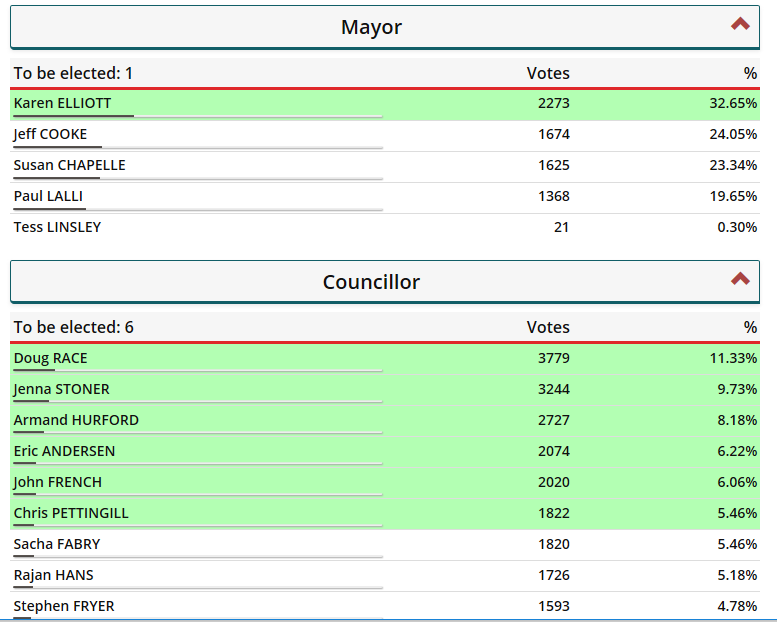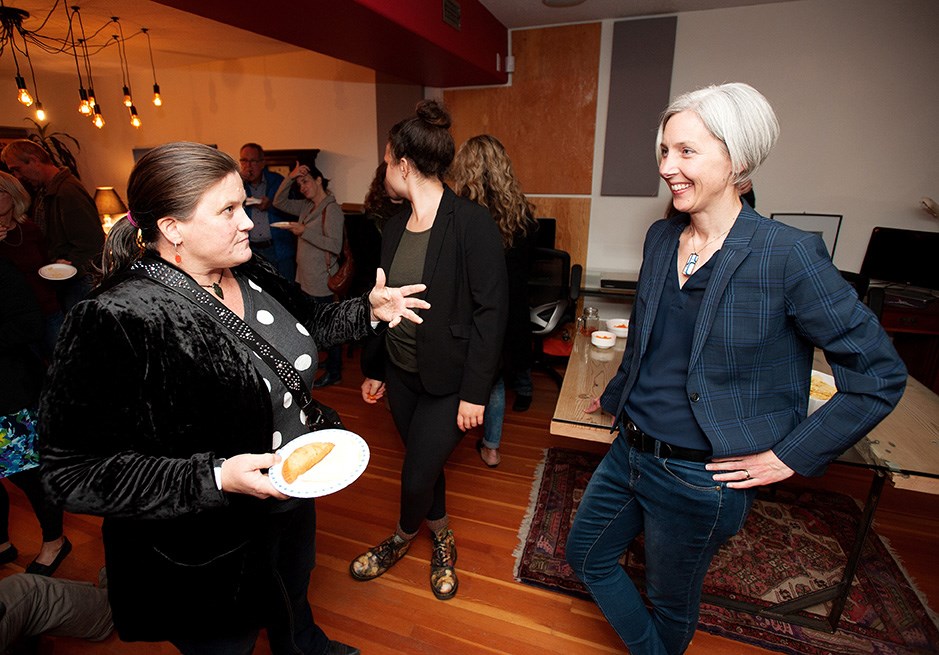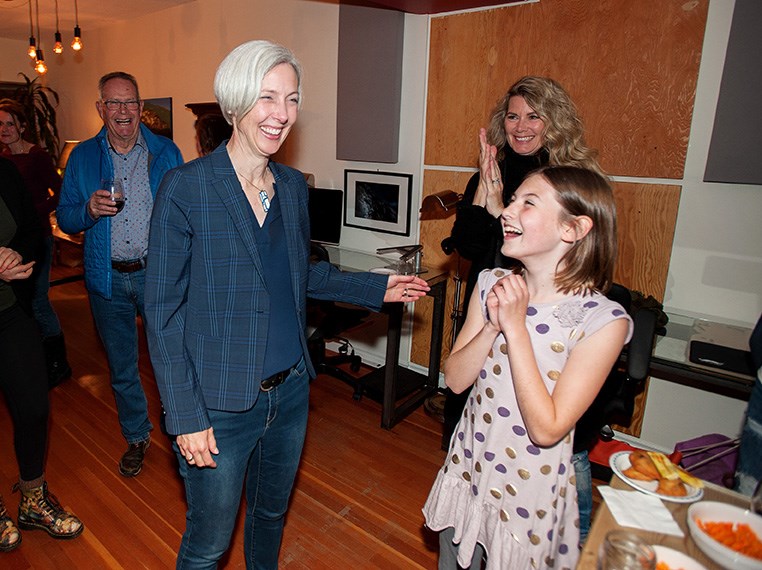With the municipal election finished, the newly elected Squamish leaders — and those who missed the mark — are settling into their new reality.
The new mayor and council will be sworn in on Nov. 6.
“I’m feeling really excited,” said mayor-elect Karen Elliott.
She said that her first priority would be to meet with new councillors and figure out their aspirations for the upcoming term.
“I think the community does a good job of always electing a diverse council,” Elliott told The Chief, just after hearing the election results on Oct. 20.
“I think they did want to see experience in the mayor’s chair because they understood there were going to be so many new people on council.”
Elliott took a decisive victory after casting herself as a mediator who could broker deals in challenging situations.
The one-term councillor soared to the top, taking 2,273 votes — 32 per cent of the vote — according to preliminary results released by the District of Squamish. Jeff Cooke was second while Susan Chapelle took third, with 1,674 and 1,625 votes respectively, roughly a quarter of the vote each.
Paul Lalli was last, with 1,368 votes, about 19 per cent of the vote.

It was a hard-fought win for Elliott, especially considering in the lead up to the vote Elliott had been sharply criticized online for her decisions regarding two contentious developments — Polygon’s Garibaldi Springs project and the Rope Runner course.
“I think that common sense prevailed. I think that social media is both good for democracy and it can be damaging for democracy,” said Elliott.
“But I like to believe that the majority of our community understood that some of the attacks were politically motivated and untrue.”
Elliott was part of a council that was at times criticized for allowing too much development. However, she said that it was a time of transition when District policies were still catching up to the pace of change.
The new Official Community Plan and Community Amenity Contribution policy should offer a good way forward, Elliott said.
“You need to have a strong back, but you also need a soft heart,” she said. “I’m going to put this campaign behind me.”
In the run up to the vote, Elliott brandished her experience at council and pointed to some policies that were enacted during her term.
Regarding the affordability crisis, she noted the District created a community amenity contribution policy that made developers contribute cash to an affordable housing fund.
She also said the District needs to work with other communities in order to lobby the province for affordable housing on Crown land.
Elliott was also in favour of adding Squamish to the provincial foreign buyers tax, something which council has already enquired about.
She also advocated for a more accessible district, saying that facilities and infrastructure should accommodate both eight and 80-year-olds.
However, in some cases, Elliott’s experience on council proved to be a stumbling block.
She supported the recent decision to allow Polygon’s controversial Garibaldi Springs development to move forward, pitting her against a sizeable number of residents who believed it would result in the loss of too much green space.
This mobilized a very vocal group of critics.
At one of the more dramatic points before the election, anonymous attack ads targeting Elliott appeared on social media.
A blog post that was sharply critical of Elliott’s vote on the Rope Runner course also gained steam online.
But she did manage to receive some high-profile support — Mayor Patricia Heintzman threw her name behind Elliott.
Outside of the municipal office, Elliott works as a consultant and was appointed as Quest University’s ombudsperson.
The 2018 municipal election was anything but dull.
Initially, the mayoral race was expected to be a two-way battle between Chapelle, a sitting councillor, and Heintzman, the incumbent mayor.
However, that quickly changed.
Cooke stepped down as the head of the Squamish Off-Road Cycling Association, or SORCA, to run for mayor in August.
Heintzman shortly after then decided to pull out of the race.
Then, Lalli, who served as councillor between 1996 and 2002, declared his candidacy in September.
Over the course of the campaign, 22 candidates stepped forward to vy for the six councillor seats up for grabs.
Preliminary results show that the town has elected Doug Race, Jenna Stoner, Armand Hurford, Eric Andersen, John French and Chris Pettingill.
The results, however, are not a final tally and still need to be finalized, after press deadline. As per each election, the votes need to go through a final audit before being approved. It was expected to be done on Oct. 24, which is the regulatory deadline.
The difference in votes between Pettingill and his closest rival candidate, Sacha Fabry, remains razor-thin — only two.
Race, an incumbent candidate, said he wasn’t too surprised he got in but was worried for Elliott.
“I am absolutely delighted,” he said. “I can never call these things and I was on pins and needles until the end, but I am very happy with that,” Race said Saturday night, just moments after the results were announced.
He said he is familiar with everyone who, according to early results, will be on council with him. “I am pretty happy with that group,” he said.
Andersen, who had run twice before unsuccessfully, sounded elated about his win when reached at the Shady Tree on election night.
He had been at a piano recital when the results were announced. When he came out, he was told what had happened.
“I was embraced by someone who gave me the news,” he said. “Of course I was very happy.”
Regarding Elliott winning the mayor’s seat, Andersen reflected on a lawn where their signs had shared space.
“Across the road is a patch of grass with an Eric Andersen sign and a Karen Elliott sign. Karen and I teased each other about that, but we are both very comfortable with that.”
He added this council, if the numbers hold, seems to be a good mix.
“One of the most important things I see in the results as I understand them so far, is balance,” he said. “Because a mayor and a council need each other and they supply different things to each other and they compliment each other.”
As of Monday, District officials have counted 7,023 votes. That’s 48.28 per cent of the voting population. This number includes mail-in ballots. There are 14,547 eligible voters in Squamish.
Nine of 10 tabulators were counted.
The tenth tabulator is a spare machine, and no votes were run through it, according to elections officer Robin Arthurs.
Advance voting numbers
With respect to the advance vote, the total number of ballots votes cast this year was 2,148, according to Arthurs.
This translated into a 15.22 per cent turnout for advanced voting in Squamish.
During the 2014 election period, that number was only 9.5 per cent, based on the 12,270 names on the voters list. In total, 1,162 advance votes were cast that year, meaning the number of early voters has almost doubled.
Other mayoral candidates react
The three other candidates vying for the mayor’s chair had responses that expressed disappointment, gratitude, and in one case, even anxiety.
Cooke, who was second to Elliott in the election, extended his thanks in an online post to his supporters while noting the results weren’t quite what he was hoping for.
When later contacted by The Chief, he noted he was happy with the race he ran, and called the ideas he proposed “innovative.”
“There weren’t many people that weren’t in my corner after getting to know me,” Cooke wrote in an email.
“I did underestimate the lure of people wanting to stick with the familiar. I thought more people would be excited to take a different path, but the lure of the familiar, reinforced [by] the sitting mayor’s strong endorsement of Karen, left our team a little bit short. I am still committed to making this community better. I will just have to find another avenue to accomplish that.”
Chapelle, who was just 49 votes away from Cooke, started her post on a reflective note, saying that her time in council was focused on health, equity and climate policy.
“I hope the new leadership can stay focused, not just on the next development but on building long-term sustainability and livability in Squamish,” she wrote on Facebook.
However, she also expressed worry about the future.
“I am now in the same boat as many citizens. Fearful of losing my home and business to higher taxation and utilities, having to look for higher paying employment out of Squamish, I am welcomed to the reality most of our citizens and businesses face.”
The election being over, a defeat of conspiracy over #science.
— Susan Chapelle (@squamishsusan) October 22, 2018
The horrid social media debates and third-party involvement is a global epidemic.
I’m happy to enter the public sector.
Concerned that there are no advocates for healthcare. #MunicipalElections2018 pic.twitter.com/Nx4T2N84xt
Meanwhile, on Twitter, her posts took on a harsher note, while hinting at what her future plans would be.
“The election being over, a defeat of conspiracy over #science,” she wrote. “The horrid social media debates and third-party involvement is a global epidemic. I’m happy to enter the public sector.”
Lalli, who took last place in the overall mayoral vote count, had a rather sparse response.
On Monday, his campaign website page was completely wiped, save for a thumbnail picture of him standing with his family and a short message.
“Thank you, Squamish!” it read.
The outgoing mayor’s view
Heintzman said she was cautiously optimistic that Elliott would win, but didn’t want to jinx it by being overly confident.
The campaign was nastier than others Heintzman has witnessed in Squamish, she said.
The negative campaigning against Elliott, which at times, Heintzman said, was “personal” and included “lies,” and “hyperbole,” likely helped — rather than hurt — the mayor-elect.
“She dealt with it so professionally and so honestly. And I find that is the case when people are basically attacking too much — all of a sudden, people come to that person’s defence.”
Heintzman said the abrasiveness of campaigning was not a determining factor in her choosing not to run for re-election, but the nastiness of politics during elections was a plus of not putting her hat in the ring this time.
“It certainly was a nice thing about not running is, I don’t have to deal with that anymore.”

Heintzman said she truly believes all those who ran and who were elected are good people, “and we should give them a break.”
As for the rest of the council-elect, Heintzman said that though the new council isn’t as ethnically diverse as the cast that campaigned, it is varied in other ways. The new council includes a diversity of opinion on some of the key issues that will be facing them, for example, she said.
“It is a good balanced group of perspectives on there. There’s someone in their 20s and someone in their 70s and everything in between.... It is a strong group,” she said.
Heintzman is leaving after a combined 13 years in municipal office, both as a multi-term councillor and after holding the town’s top job for four years.
Something to keep in mind
Outgoing Coun. Peter Kent, who just ran for council in his hometown of Nanaimo, offered some words of advice to first-time politicians.
“Be prepared to be stopped at the grocery store, gas station, on the street, at the school, because that is part of the job,” he said in a conversation with The Chief, adding the workload is intense and will continue to be.
“And treat the [District] staff with respect, for God’s sake,” he said.
“The staff are your boots on the ground. The staff are knowledgeable. The staff do everything for you. You delegate, they do and so treat that with a modicum of respect and understand that they are just there trying to do their jobs.”
As for Kent’s own fortunes in Nanaimo, he wasn’t able to claim a seat on council.
“I didn’t make the cut in Nanaimo,” he later posted on Facebook. “However, it was a great experience and met some great folks. My family and I wish Squamish all the best and cannot thank you enough for the past 12 years we lived here!”
He extended his congratulations to the newly elected Squamish council, as well as those who sat with him in his past term.
“Take care of my council seat and don’t steal my Terminator coffee mug on my desk,” he wrote.
Kent stepped into the race for Nanaimo municipal hall shortly after moving from Squamish to Vancouver Island.
He came in 13th place, with 4,776 votes, according to numbers compiled by Civic Info BC. Forty people ran for the municipality’s eight council seats.
Kent, however, wasn’t the only former Squamish politician to offer words of advice to the town’s new council.
Former Squamish mayor Corrine Lonsdale said those who are elected should not forget who got them in as the weeks, months and years of their terms tick away.
“Council loses touch with the electorate,” she said. “Council members must not forget who elected them. It was not the developers. It was the people who actually live in Squamish today.”
She also had a message to voters.
“Don’t forget the people that you voted for. You better connect with your council members from time to time and let them know how they are doing. The voters have some responsibility as well.”
Howe Sound mock election
While the grown-ups selected Elliott as Squamish’s new mayor, highschool students in town had a different idea about who should have the community’s top job.
In a mock election, the student body of Howe Sound Secondary selected Jeff Cooke to be the district’s new mayor.
For council, they picked Eric Anderson, Edward Archibald, John French, RajanHans, Jenna Stoner and Mike Young.
Turnout among the youth actually exceeded that of the adult voters.
There was a 59 per cent turnout among students at the school. That means 353 of the 600 students in the school showed up to cast ballots.
This vote is part of a program run by CVIX, a non-profit organization that organizes student vote programs to mimic federal, provincial and municipal elections in Canada.
It sends ballots, voting screens and ballot boxes to schools with the idea that if youth are in the habit of voting when there is an election, they will be more likely to vote when they turn 18.
Howe Sound teacher Heather Lafreniere put together the event with her Social Justice 12 and Social Studies 11 classes



